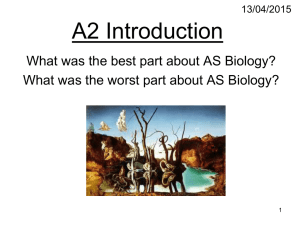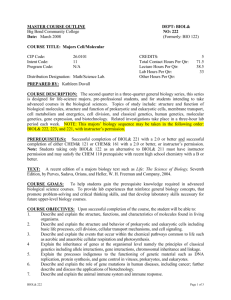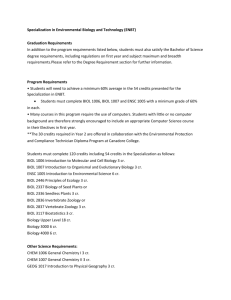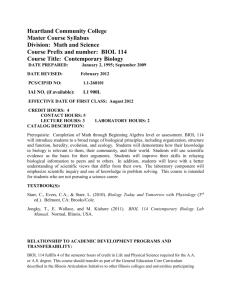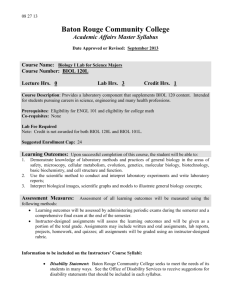revised
advertisement
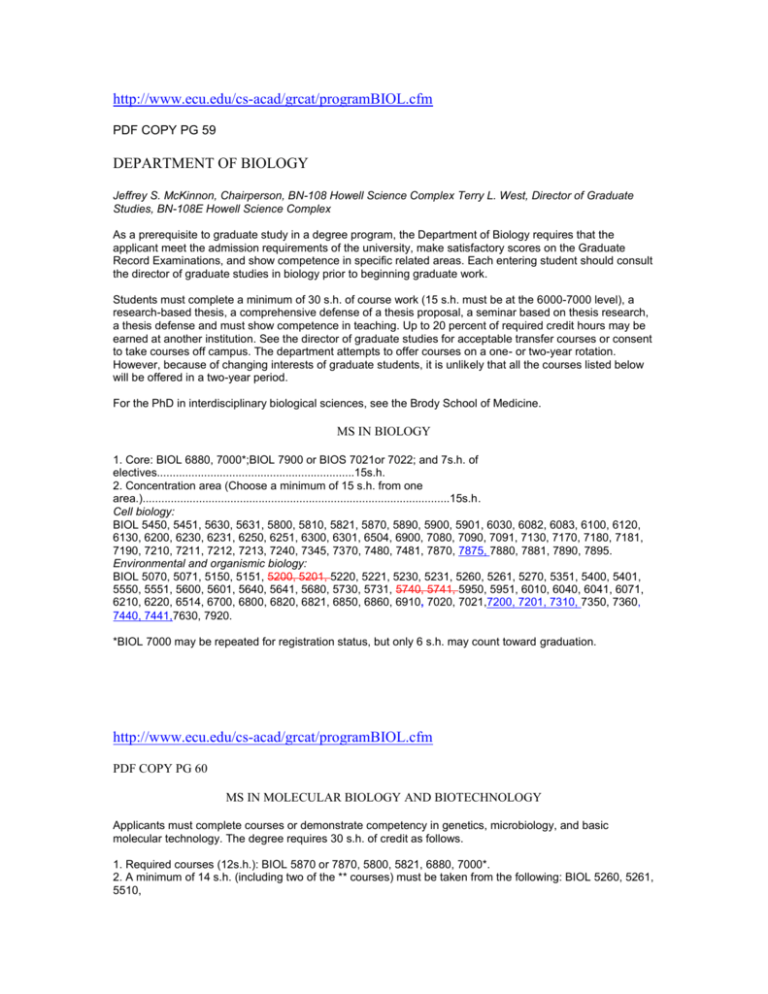
http://www.ecu.edu/cs-acad/grcat/programBIOL.cfm PDF COPY PG 59 DEPARTMENT OF BIOLOGY Jeffrey S. McKinnon, Chairperson, BN-108 Howell Science Complex Terry L. West, Director of Graduate Studies, BN-108E Howell Science Complex As a prerequisite to graduate study in a degree program, the Department of Biology requires that the applicant meet the admission requirements of the university, make satisfactory scores on the Graduate Record Examinations, and show competence in specific related areas. Each entering student should consult the director of graduate studies in biology prior to beginning graduate work. Students must complete a minimum of 30 s.h. of course work (15 s.h. must be at the 6000-7000 level), a research-based thesis, a comprehensive defense of a thesis proposal, a seminar based on thesis research, a thesis defense and must show competence in teaching. Up to 20 percent of required credit hours may be earned at another institution. See the director of graduate studies for acceptable transfer courses or consent to take courses off campus. The department attempts to offer courses on a one- or two-year rotation. However, because of changing interests of graduate students, it is unlikely that all the courses listed below will be offered in a two-year period. For the PhD in interdisciplinary biological sciences, see the Brody School of Medicine. MS IN BIOLOGY 1. Core: BIOL 6880, 7000*;BIOL 7900 or BIOS 7021or 7022; and 7s.h. of electives...............................................................15s.h. 2. Concentration area (Choose a minimum of 15 s.h. from one area.)..................................................................................................15s.h. Cell biology: BIOL 5450, 5451, 5630, 5631, 5800, 5810, 5821, 5870, 5890, 5900, 5901, 6030, 6082, 6083, 6100, 6120, 6130, 6200, 6230, 6231, 6250, 6251, 6300, 6301, 6504, 6900, 7080, 7090, 7091, 7130, 7170, 7180, 7181, 7190, 7210, 7211, 7212, 7213, 7240, 7345, 7370, 7480, 7481, 7870, 7875, 7880, 7881, 7890, 7895. Environmental and organismic biology: BIOL 5070, 5071, 5150, 5151, 5200, 5201, 5220, 5221, 5230, 5231, 5260, 5261, 5270, 5351, 5400, 5401, 5550, 5551, 5600, 5601, 5640, 5641, 5680, 5730, 5731, 5740, 5741, 5950, 5951, 6010, 6040, 6041, 6071, 6210, 6220, 6514, 6700, 6800, 6820, 6821, 6850, 6860, 6910, 7020, 7021,7200, 7201, 7310, 7350, 7360, 7440, 7441,7630, 7920. *BIOL 7000 may be repeated for registration status, but only 6 s.h. may count toward graduation. http://www.ecu.edu/cs-acad/grcat/programBIOL.cfm PDF COPY PG 60 MS IN MOLECULAR BIOLOGY AND BIOTECHNOLOGY Applicants must complete courses or demonstrate competency in genetics, microbiology, and basic molecular technology. The degree requires 30 s.h. of credit as follows. 1. Required courses (12s.h.): BIOL 5870 or 7870, 5800, 5821, 6880, 7000*. 2. A minimum of 14 s.h. (including two of the ** courses) must be taken from the following: BIOL 5260, 5261, 5510, 5511, 5520, 5521, 5890, 5900**, 5901**, 5930, 5931, 6030, 6082, 6083, 6100, 6120, 6200, 6230, 6231, 6250**, 6251**, 6504, 6514, 6992, 6993, 7080, 7180**, 7181**, 7190, 7210, 7211, 7212, 7213, 7480**, 7481**, 7875, 7880, 7881, 7890, 7895. 3. Electives: A maximum of 4s.h. may be designated at the candidate’s option as elective hours with the approval of the graduate director and the candidate’s advisor, to complete graduation requirements of 30 s.h. for this degree. *BIOL 7000 may be repeated for registration status, but only 6 s.h. may count toward graduation. Internship Option: Qualified students will be encouraged to spend from six months to one year in an internship at an industrial or governmental research laboratory. From 2-5 s.h. of internship credit can be applied toward the degree. BIOL: Biology 5070, 5071. Ornithology (4,0) 3 lecture hours and 1 3-hour lab per week. Field trips to observe native birds in natural surroundings required. P: 8 s.h. in BIOL. Survey of world’s birds. Emphasis on ecology, evolution, and behavior: adaptive radiation, migration, flight mechanics, morphology, taxonomy, bird song, reproduction, population biology, and conservation of birds. 5150, 5151. Herpetology (4,0) 3 lectures and 1 3-hour lab per week. P: 8 s.h. in BIOL. Taxonomy, anatomy, physiology, distribution, phylogeny, natural history, and ecology of reptiles and amphibians of the world. Emphasis on species of NC and Atlantic Coastal Plain. 5200, 5201. Invertebrate Zoology (4,0) 3 lectures and 1 3-hour lab per week. P: 6 s.h. in BIOL. General comparative anatomical and physiological aspects of invertebrate groups. Emphasis on similarities, differences, and evolution. 5220, 5221. Limnology (4,0) 3 lectures and 1 3-hour lab per week. P: BIOL 2250, 2251; or consent of instructor. Physical, chemical, and biological factors of inland waters and their influence on aquatic organisms. 5230. Biology of Algae (3) 3 lecture hours per week. P: BIOL 1100, 1101 (or equivalent) or consent of instructor. Surveys physiology, ecology evolution, and importance to society of organisms commonly referred to as algae. 5231. Biology of Algae Laboratory (1) 1 3-hour lab per week. C: BIOL 5230 or consent of instructor. Surveys algal form and function, combined with a group project that uses molecular biotechnology to study some aspect of algal biology. 5260, 5261. Microbial Ecology (4,0) 3 lectures and 2 2-hour labs per week. P: BIOL 2250, 2251, 3220, 3221; or consent of instructor. Interactions between microorganisms and their physical, chemical, and biological environment. Microbial involvement in energy flow, nutrient cycling, and intra/inter-specific interactions. Introduces statistical analyses of biological and ecological data. 5270. Marine Community Ecology (3) P: BIOL 2250, 2251; or consent of instructor. Advanced examination of ecology of marine and brackish water communities based on principles of population biology and community ecology. Emphasis on current hypotheses concerning processes structuring major communities. 5351. Biological Processes and the Chemistry of Natural Water (2) 6 lab hours per week. P: BIOL 2250, 2251; 2 CHEM courses; or consent of instructor. Interactions of water quality and biological processes in aquatic ecosystems. 5370. Biological Effects of Radiation (3) P: BIOL 1100, 1101, 1200, 1201; or consent of instructor. Biological effects resulting from interactions of radiation and matter for scientifically, technically, and medically-oriented students. 5400. Wetland Ecology and Management (3) P: BIOL 2250, 2251; or consent of instructor. Marshes, swamps, bogs, fens, and other intermittently flooded ecosystems. Emphasis on classification, ecosystem processes, structure, and management of freshwater and saltwater wetlands. 5401. Wetland Ecology Laboratory (1) P: BIOL 2250, 2251; C: BIOL 5400. Application of methods to measure ecological properties, assess functioning, identify plant communities, and understand landscape interaction of wetland ecosystems. 5450, 5451. Histology (4,0) 2 lectures and 2 2-hour labs per week. P: 4 BIOL courses. Organization of cells, tissues, and organs at microscopic level. 5510, 5511. Transmission Electron Microscopy (4,0) 2 lecture and 6 lab hours per week. P for undergraduate students: Senior standing as BIOL major or consent of instructor. Introduces theory, design, and use of transmission electron microscope and preparation of biological materials for its use. 5520, 5521. Scanning Electron Microscopy and X-Ray Analysis (2,0) 1 lecture and 4 lab hours per week. P for undergraduate students: Senior standing as a BIOL major or consent of instructor. Introduces theory and techniques of scanning electron microscopy and X-Ray analysis and preparation of materials for both. 5550, 5551. Ichthyology (4,0) 2 lectures and 2 3-hour labs per week. Evolution and biology of world’s major fish groups. Emphasis on NC species. 5600, 5601. Fisheries Techniques (3,0) For biology majors interested in marine biology. Field trips and field studies are integral. 2 lectures and 1 3-hour lab or field excursion per week. P: BIOL 2250, 2251; or equivalent. Practical training in field and lab experimental methods in fisheries techniques. 5630, 5631. Comparative Animal Physiology (4,0) 3 lectures and 1 3-hour lab per week. P: 2 BIOL and 2 organic CHEM courses. Principles of function of organ systems of major groups of animals. Nutrition, digestion, respiration, skin and temperature control, blood and circulatory systems, excretion, the muscularskeletal system, nervous coordination, and endocrine system. 5640, 5641. Entomology (4,0) 3 lectures and 1 3-hour lab per week. P: 12 s.h. BIOL. General anatomy, physiology, ecology, and classification of insects. 5680. Current Topics in Coastal Biology (3) P: Consent of instructor. Seminar on environmental issues in coastal biology presented by directed reading, lecture, and discussion. 5730, 5731. Animal Physiological Ecology (4,0) 3 lectures and 1 3-hour lab per week. P: BIOL 2250, 2251; 3310, 3311 or 3320, 3321 or 5800, 5821; or consent of instructor. Physiological adjustments and responses of animals to their environment. Considers mechanisms involved and invertebrate, vertebrate, aquatic, and terrestrial animals. 5740, 5741. Behavioral Ecology (4,0) 3 lecture and 2 discussion hours per week. P: BIOL 4200, 4201. Animal behavior from evolutionary perspective. Readings from current scientific literature and weekly discussions. 5750, 5751. Introduction to Regional Field Ecology (2,0) (5750:WI) For science and environmental studies teachers. 20 hours of lecture and 32 hours of field trips. May not count toward MS in BIOL or molecular biology/biotechnology. Major regional ecosystems. 5800. Principles of Biochemistry I (3) 3 lecture hours per week. P: BIOL 3310, 3311; or consent of instructor; CHEM 2760, 2763. Intermediary metabolism, metabolic processes, and metabolic regulation of major groups of compounds in living cells. 5810. Principles of Biochemistry II (3) May be taken before BIOL 5800. P: BIOL 3310, 3311; or consent of instructor; CHEM 2760, 2763. Protein biochemistry. Structure and function of amino acids and proteins, including protein biosynthesis and kinetics. Structures illustrated using computer-modeling techniques. 5821. Principles of Biochemistry Laboratory (1) Required for biochemistry majors; recommended for biologyvmajors. P/C for undergraduate students: BIOL 5800 or 5810. General biochemistry lab designed to complement BIOL 5800, 5810. 5870. Molecular Biology of the Gene (3) P: BIOL 2300. Genetics of prokaryotic and eukaryotic organisms at molecular level. Structure and function of nucleic acids; replication, recombination, and repair; control of gene expression; and other related topics. 5890. Virology (3) P: BIOL 2100, 2101 or 7870; 3220, 3221. Plant, animal, and bacterial viruses. Emphasis on distinctive features of viruses as related to parasitism, disease, and basic research. 5900, 5901. Biotechniques and Laboratory (2,3) 2 1-hour lectures and 2 4-hour labs per week. P: BIOL 2100, 2101, 7870; consent of instructor; RP: BIOL 5810, 5821; C for 5901: BIOL 5900. Theory and practice of modern genetic engineering technology. Topics include DNA purification, electrophoresis, restriction mapping, use of DNA modifying enzymes, basic cloning in plasmid vectors, and strain construction by conjugation and transduction. 5930, 5931. Microcomputer Applications in Molecular Biology (2,0) 1 lecture and 1 3-hour lab per week. P: BIOL 3310, 3311; or 5810, 5821; or 5870. Techniques for analysis of biological characteristics of nucleic acid and protein molecules using BASIC with microcomputers. 5950, 5951. Taxonomy of Vascular Plants (4,0) 1 2-hour lecture and 1 4-hour lab per week. P: 12 s.h. BIOL or consent of instructor; RP: BIOL 2250, 2251. Plant importance, identification, classification, and evolution as well as how plants interact with living and nonliving environments. Field experiences emphasize major communities and dominant floral elements of coastal NC. 5995. Internship (1) 3 hours per week. May be repeated once for a maximum of 2 s.h. P: Consent of instructor. Lab experiences under direct supervision of a member of biology faculty. 6003. Seminar (1) Student, staff, and guest speakers on current research. 6010. Estuarine Ecology (2) P: BIOL 2250, 2251; or consent of instructor. Physical properties, energy flow, biogeochemical cycling, and biological patterns of estuaries. 6030. Topics in Cell Biology (3) P: Consent of instructor. Some combination of current work in bioenergetics, membrane biology, immunobiology, cell/organelle differentiation, and functions of specialized cells. Other topics not routinely considered in undergraduate courses will be reviewed also. Content varies with instructor interests. 6040, 6041. Animal Behavior (4,0) 3 lectures and 1 3-hour lab per week. P: Consent of instructor. Presentation of historical development of animal behavior as field of study through directed reading, discussion, and practical experience. Presentation of some current principles and experimental approaches to animal behavior. 6071. Human Gross Anatomy (4) P: Consent of instructor. Dissection-based regional study of human cadaver. 6082, 6083. Fundamentals of Vertebrate Endocrinology (3,1) 3 lectures and 1 3-hour lab per week. P: BIOL 3310, 3311; or 3320, 3321; or equivalent; C for 6083: BIOL 6082. Neurosecretions and endocrine glands. Emphasis on evolution, development, morphology, and physiology of endocrine system. Hormone biosynthesis and mechanisms of action. 6100, 6120. Advances in Molecular Biology (2,2) May be repeated once for credit with consent of instructor. P: BIOL 5810, 5821; or 5870; consent of instructor. In-depth focus on problems of current interest in molecular biology and genetic engineering. Topics vary. 6110. Bioterrorism and Biosecurity (3) Detection and identification of and defense against biological warfare agents, including international and domestic security programs. 6130. Advances in Developmental Biology (2) P: Consent of instructor. Recent advances in animal and plant development. Specific discussion includes gene regulation, embryonic induction, hormone action, cell movement, cell growth, photoperiodism, etc., in relation to differentiation. 6200. Mechanisms of Genetic Recombination (2) P: BIOL 3220, 3221; or 5870; 5810, 5821; consent of instructor. Aspects of genetic recombination, including general and site specific recombination, gene mapping methods, DNA and RNA sequence rearrangements, and transposable genetic elements. Emphasis on current developments in growing field. 6210. Phylogenetic Theory (3) Theory and practice of modern phylogenetic methods. Topics include basic evolutionary concepts, reconstructing evolutionary relationships using molecular and other data, and statistical methods for assessing reliability of phylogenetic analyses. Emphasis on hands-on experience with phylogenetic computer programs. 6220. Evolution: Topics for Advanced Students (3) P: A genetics course. Current concepts of evolution, presented by reading, lecture, and discussion. 6230, 6231. Advanced Techniques in Molecular Biology (2,3) 2 lectures and 2 4-hour labs per week. P: BIOL 5900, 5901; C for 6231: 6230. Advanced genetic engineering techniques for basic and applied research. 6250, 6251. Protein Purification Techniques (4,0) P: BIOL 5810, 5821. Purification methods used to isolate enzymes and other proteins from living cells. Recombinant DNA-based enzyme purification techniques. 6300, 6301. Neurophysiology (3,0) 2 lectures and 1 3-hour lab per week. P: BIOL 3310, 3311; or 3320, 3321; or equivalent. Cellular physiology of neurons and interrelationships between neurons. 6410. Contemporary Molecular and Cellular Biology for Advanced Placement Teachers (2) In-depth review of energy transformations in cells, cell division, molecular genetics, and enzyme systems. Emphasis on advances in knowledge during past decade. Course coordinator arranges lecturers on selected topics. 6420. Contemporary Organismal Biology for Advanced Placement Teachers (2) In-depth review of plant structure and function. Emphasis on angiosperms, animal structure, and function. Vertebrates and reproduction and development of plants and animals. Course coordinator arranges lecturers on selected topics that emphasize advances in knowledge during past decade. 6430. Contemporary Population Biology for Advanced Placement Teachers (2) In-depth review of genetics, evolution, behavior, ecology, and social biology. Emphasis on advances in knowledge during the past decade. Course coordinator arranges lecturers on selected topics. 6504, 6514. Research Problems in Biology (2,2) 4 research hours per week. May be repeated for credit with change of topic. P: Consent of instructor. Research completed under supervision of faculty member. 6700. Plant Physiological Ecology (2) P: One ecology course. Physiological mechanisms of plants relevant at individual, community, and ecosystem levels. Emphasis on higher plants in stressful environments. 6800. Population Ecology (2) P: One ecology course; consent of instructor. Intrinsic and extrinsic controls of microbe, plant, and animal population dynamics. 6820, 6821. Systems Ecology (3,0) 2 lectures and 1 3-hour lab per week. P: One ecology course; consent of instructor. Ecosystem structure and function utilizing systems analysis methods and computer models. 6850, 6860. Advances in Ecology (2,2) May be repeated for credit with change of topic. P: BIOL 2250, 2251; or equivalent; consent of instructor. Advanced treatment of specialized topics in ecology. Emphasis on readings from primary literature. 6880. Introduction to Research (2) Library reference services and cataloging systems. Writing techniques and problems encountered in preparation of thesis and research publications. 6900. Vertebrate Reproductive Biology (3) P: One cell and developmental biology or physiology course or consent of instructor. Mechanisms involved in vertebrate reproduction. Morphology, physiology, and biochemistry of reproductive systems. Topics include neuroendocrine control, environmental, and other factors regulating reproductive cycles as well as current research in reproductive technology. 6910. Coastal Ecological Processes (4,0) For PhD students without biology backgrounds and biology MS students. Provides PhD students in coastal resources management with fundamental concepts of ecology within context of coastal zone and with emphasis on local ecosystems. 6992, 6993. Internship in Applied Biology (3,2) Variable classroom and/or lab hours per week. P: Completion of basic courses prescribed by joint screening committee composed of faculty from the biology department closely allied to proposed area of study and representatives from specific applied area (industry, government, etc.) Experience in classroom, research, governmental, or industrial applications of biology. 6994. Internship (1) 3 contact hours per week. May be repeated for credit. P: Consent of instructor. Experience in classroom situations under direct supervision of biology faculty member. 7000. Thesis (1-6) May be repeated. May count maximum of 6 s.h. 7001. Thesis: Summer Research (1) May be repeated. No credit may count toward degree. Students conducting thesis research may only register for this course during summer. 7005. Coastal Ecological Processes (4) Formerly BIOL 6910 P: Graduate standing in CRM program or consent of instructor. For PhD students and natural science MS students. Presentation and discussion of fundamental concepts of chemistry and biology within the context of the coastal zone and with emphasis on local ecosystems. 7010. Estuarine Ecology (3) Formerly BIOL 6010 P: Consent of instructor. Discussion of the physical and biological properties of estuaries, estuarine fisheries, and human impacts on estuaries. 7020, 7021. Marine Biology (3,0) Formerly BIOL 6020, 6021 P: Consent of instructor. Biology and ecology of marine organisms with at least one field trip to coast for collection and identification. 7080. Molecular Endocrinology (3) P: Consent of instructor. Review of modern concepts, theories, techniques and frontiers of molecular endocrinology with emphasis on functions, structures, signaling and regulation of hormones and receptors. 7090, 7091. Experimental Embryology (4,0) Formerly BIOL 6090, 6091 3 lecture amd 1 3-hour lab per week. P: BIOL 4060, 4061. Historical and current understanding of molecular mechanisms underlying development. Applies experimental techniques to marine invertebrates, amphibian, and chick material. 7130. Current Literature in Development Biology (1) P: Consent of instructor. Review of current research literature related to development biology. Emphasis on critical analysis. 7170. Immunology I (3) P: 1 course in genetics and 1 course in microbiology, or consent of instructor. Introduces immunology. Emphasis on lymphocytes, antigen presenting cells, lymphoid tissue, and antibodies. 7180, 7181. Cell Culture and Hybridoma Technology (3,0) Formerly BIOL 6180, 6181 1 lecture and 6 lab hours per week. P: BIOL 7170 or equivalent. Principles and mechanisms of producing monoclonal antibodies. Emphasis on basic science application of monoclonal antibodies and laboratory techniques in cell culture and construction of hybridomas. Includes discussion of recent literature that includes scientific application of monoclonal antibodies. 7190. Immunology II (3) Formerly BIOL 6190 P: BIOL 7170 or equivalent. Emphasis on MHC and T cell biology. Includes review and presentation of recent immunological literature. 7200, 7201. Invertebrate Biology (4,0) Formerly BIOL 5200, 5201 3 lecture and 1 3-hour lab per week. P: 8 s.h. in BIOL. Functional anatomy, development, ecology and evolutionary history of invertebrates. Lab emphasizes species of the Southeast Atlantic coast and estuaries. 7210, 7211. Transgenic Methodology and Application (2,3) 2 lectures and 1 6-hour lab per week. P: BIOL 5900, 5901 or consent of instructor; C for 7211: BIOL 7210. Production of transgenic animals and evaluation of selected genetic engineered constructs. 7212, 7213. Gene Targeting and Knockout Animals (2,3) 2 lectures and 1 6-hour lab per week. P: BIOL 5900, 5901, 6480, 6481; or consent of instructor; C for 7212: BIOL 7213. Gene manipulation and production of knockout animals. 7215. Advanced Topics in Phylogenetic Theory (3) P: BIOL 6210 or consent of instructor. Current advanced topics in the theory and practice of modern phylogenetics presented by reading, lecture, and discussion. 7240. The Evolution of Genes and Genomes (3) Recent advances in comparative genomics, focusing on the evolution of more complex eukaryotic genomes. 7300. Landscape Ecology (3) P: Consent of instructor; RP: an ecology course; a statistics course. Interaction between spatial distribution of habitat patches and ecological processes at different scales. 7310. Ecological Modeling and Simulation (3) P: BIOL 2250, 2251 or equivalent; or consent of instructor. Dynamic computer models of ecological systems. Focus on the development of algorithms and numerical solutions to ecological processes at diverse hierarchical scales. 7320. Ecological Dimensions of Coastal Management (3) P: Consent of instructor. Key ecosystem perspectives and environmental policies associated with coastal management and land-use. Ecological and environmental framework of coastal cities as they pertain to the functioning of a healthy human ecosystem. 7330. Ecosystems of Coastal Cities (3) P: Consent of instructor. Structure and function of coastal cities as an ecosystem. Political and economic framework of coastal cities as they pertain to the functioning of a healthy urban ecosystem. 7345. Cell Motility (2) Formerly BIOL 6345 Same as ANAT 7345; BIOC 7345 P: General chemistry, organic chemistry, general biology, and general physics; or consent of instructor. Multidisciplinary exploration of mechanism, structure, and function of motile systems essential for eukaryotic life. 7350. Current Literature in Fish Ecology (1) P: Consent of instructor. Review of current research literature related to fish ecology, fisheries, and fisheries management with emphasis on critical analysis. 7360. Fisheries Management (3) P: BIOL 2250 or 3660; MATH 2121; consent of instructor. Introduces fisheries management topics, including exploited populations of living aquatic resources – fish, shellfish, and other harvestable organisms. 7740, 7741. Behavioral Ecology (4,0) Formerly 5740, 5741 3 lecture and 2 lab hours per week. P: Permission of instructor. Animal behavior investigated through the integration of evolution, ecology, and genetics. Readings from a text and current scientific literature, and weekly discussions. 7870. Molecular Genetics (3) Formerly BIOL 6870 P: 1 course in genetics and 2 semesters of organic chemistry or consent of instructor. Introduces molecular mechanisms responsible for DNA replication, repair, and recombination as well as transcription and translation. 7875. Plant Molecular Biology (3) P: BIOL 5870, 7870; or consent of instructor. Introduction and analysis of the molecular mechanisms regulating plant physiology, growth and development. 7890. Current Literature in Molecular Biology (1) Formerly BIOL 6890 P: Consent of instructor. Review of current research literature related to molecular biology. Emphasis on critical analysis. 7880, 7781. Bioinformatics (4,0) P: Course in biochemistry or consent of instructor. Bioinformatic skills necessary for routine molecular sequence analyses using computational programs. 7895. Current Literature in Cell Biology (1) P: Consent of instructor. Review of current research literature related to cell biology. Emphasis on critical analysis. 7900. Ecological Statistics (3) P: Consent of instructor; RP: an ecology course. Philosophy of statistical methods, principles of sampling and experimental design, and common approaches to the analysis of ecological data. 7920. Conservation Biology (3) Formerly BIOL 6920 P: Consent of instructor; RP: an ecology course. Applies principles of ecology, biogeography, population genetics, economics, sociology, anthropology, and philosophy to maintenance and restoration of biological diversity and management. 7950. Preparing for the Job Market (3) P: Consent of instructor. Skills pertinent for career development beyond the Ph.D., including public speaking, the job search, job application materials, interviewing techniques, networking, and job discussion panels. 7970. Teaching Natural Science in Higher Education (3) P: Consent of instructor. Pedagogical best practices and unique aspects of teaching and learning of the natural sciences in higher education contexts. 8810. Methods and Techniques (3) May be repeated for credit. P: Consent of instructor. One semester rotation through research laboratories supervised by IDPBS approved faculty members. 8815. Seminar in Biological Sciences (1) May be repeated for credit. P: Consent of instructor. Presentations on research or critical review of current literature topics by students in IDPBS program. Seminar presentation. 9000. Dissertation Research (3-12) May be repeated. May count a maximum of 18 s.h. 9000. Dissertation Research (3-12) May be repeated. May count a maximum of 36 s.h. This course is not included in meeting the cumulative “B” average required for graduation. 9001. Dissertation: Summer Research (1) May be repeated. No credit may count toward degree. Students conducting dissertation research may only register for this course during the summer. BIOL Banked Courses 5050. Applied Ecology (3) 5880, 5881. Microbial Physiology (4,0) 5910, 5911. Vascular Plant Systematics (4,0) 5920, 5921. Vertebrate Systematics (4,0)


